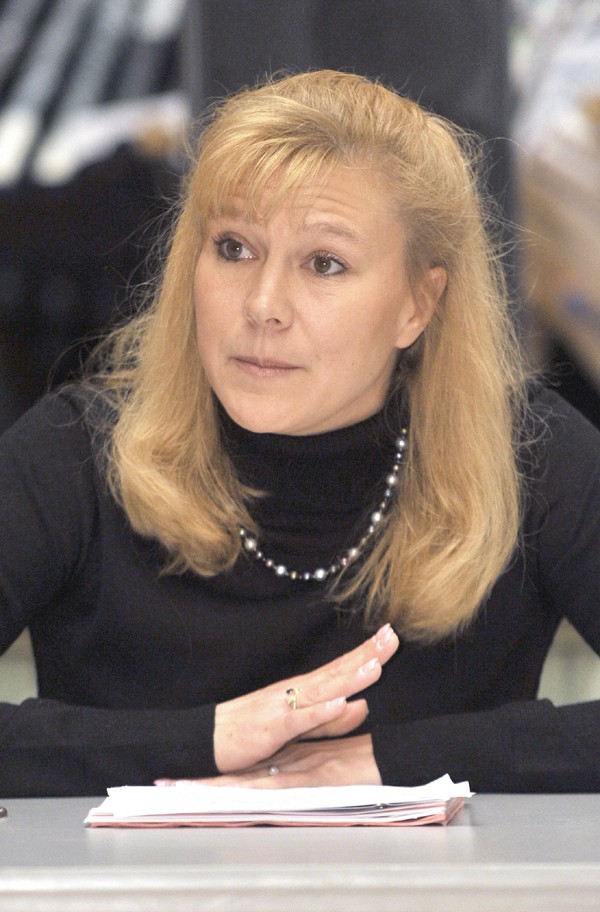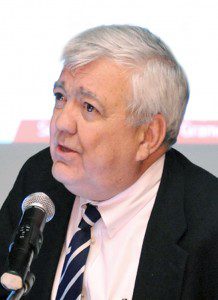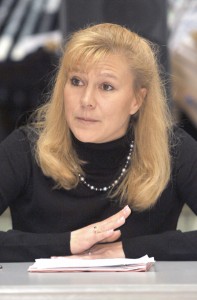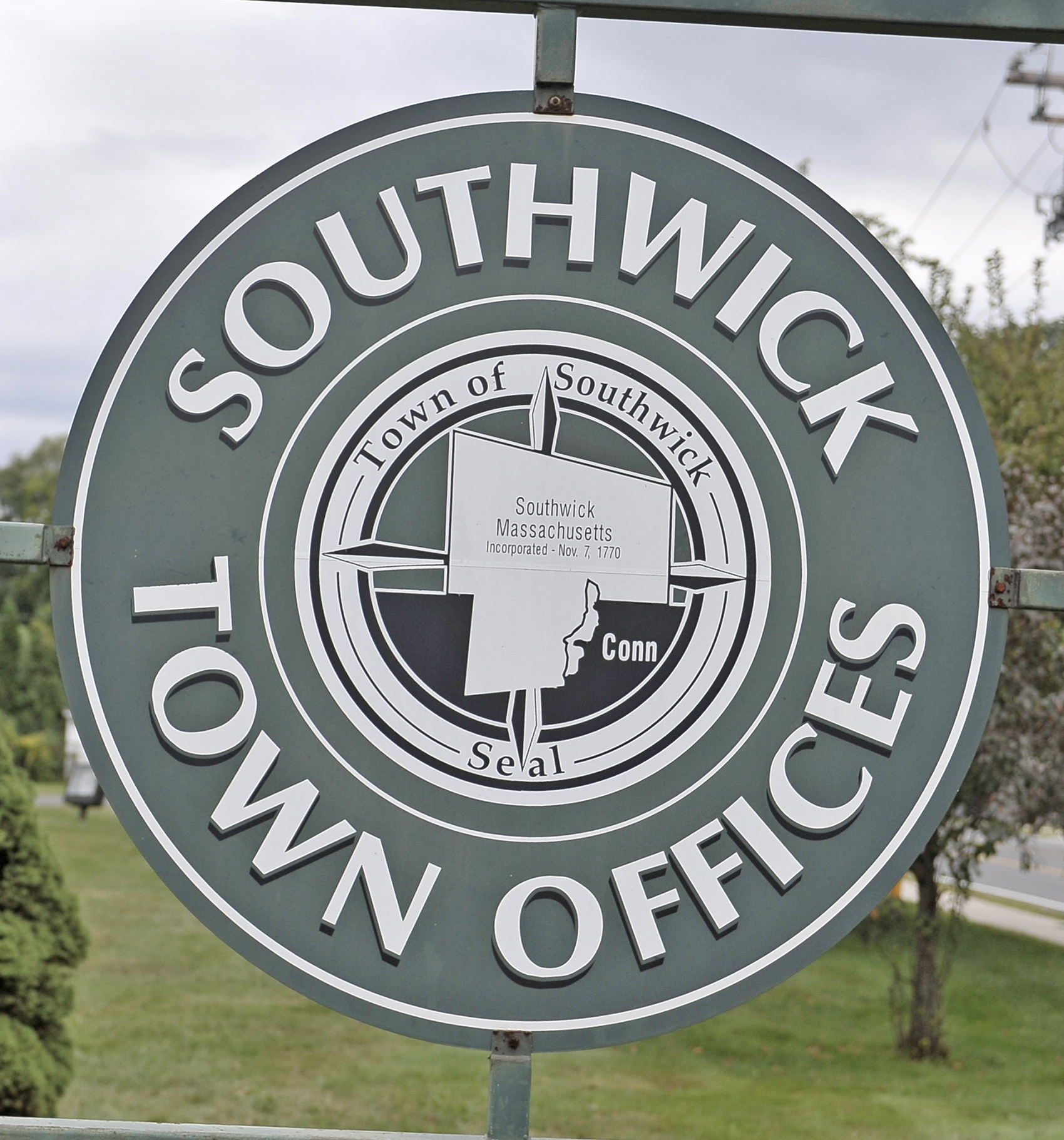SOUTHWICK – The town was divided throughout much of 2012, with school projects and elections causing the division.
The division started in January when, after a town meeting voted to approve funding the school project, the ballot question to approve a debt exclusion for the town’s share of the $72 million project was defeated.
After some major revisions, the project, which encompasses Woodland Elementary, Powder Mill Middle, and Southwick-Tolland-Granville Regional High School, was approved.
At the Jan. 10 Town Meeting, with a vote of 446-183, Southwick voters approved a debt exclusion to pay its share of a $72 million school renovation project. The project is unique because the Massachusetts School Building Authority (MSBA) offered reimbursement for renovations to the three schools as a group. In order to take a campus approach to the project, Southwick, Tolland and Granville had to pass an agreement for Granville to join the regional school district at special town meetings in all communities.
The MSBA has signed a contract to fund 60 percent of the project, leaving nearly $30 million up to the towns to fund. Superintendent John Barry said necessary repairs to the three schools would cost $60 million if the district tackled them alone.
Tolland and Granville passed the project at town meeting and during special elections. In order to keep the project – and the MSBA reimbursement – alive, the project was tweaked to lower the cost to taxpayers. In March, the Board of Selectmen unanimously agreed to allow voters to cast their vote on a revised school renovation project. The question will be the only one on the May 8 ballot.
The original project, which encompasses renovations and upgrades at three schools, was estimated to cost $400 in additional yearly taxes for properties valued at $255,000, the median home value in Southwick. The revised project would add just under $230 in annual taxes to the same property for the life of the 25-year bond, which represents about a 40-percent reduction from the original project.
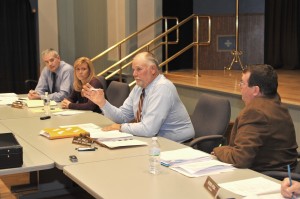
Southwick Selectman Arthur Pinell, second from left, addresses a question from a town attorney during a meeting in the Southwick Town Hall. (File photo by chief photographer Frederick Gore)
In addition to $2.5 million in project cuts made to exterior plans, the schools and town agreed to lower its annual capital borrowing by $250,000 a year. Town Accountant Linda Carr said this would be a debt swap of sorts.
“Right now the school puts $600,000 in borrowing in its capital budget,” said Carr. “They are committing $250,000 that they would have put to capital projects directly towards this project.”
In May, the revised project passed by 84 votes. Project supporter Jim Doyle, part of a project advocacy organization called Invest In Southwick, was “elated” when the votes were tallied. He said there was a major effort to bring a revised project to voters for approval.
“I think as a group, along with town officials and the Invest In Southwick group, there was a combination of efforts,” said Doyle.
Doyle said most original “no” voters cited the tax increase as the main reason they voted down the project, which had an original price tag of $72 million. He said while encouraging voters to support the revised project, there was an effort to make residents aware of “truthful data.”
Doyle said the main reason for the project is the children of Southwick.
“The kids win first, and when the kids win, the community wins,” he said. “The children will have a better, more complete education and the taxpayers will get better home values – everybody wins.”
Another source of division in Southwick in 2012 was the June election when political newcomer Tracy Cesan defeated longtime selectman Fred Arnold.
The selectman race was neck and neck, with Cesan barely edging out Arnold.
Arnold received 1,250 votes to Cesan’s 1,274. At a celebration at Roma’s Restaurant, Cesan was surrounded by family and friends, whom she credited with helping her win.
“This is my team,” Cesan said, pointing to supporters filling the room. “I didn’t win, we all won. We all worked really hard.”
Cesan’s election night victory was just the start of what would be a contentious beginning to her political career.
Because Cesan is an employee of the Southwick Fire Department, her ability to vote on certin issues was an immediate concern for her fellow board members Arthur Pinell and Russell Fox. Cesan sought an opinion from the state ethics commission prior to her election and it was stated that she could not vote on matters pertaining to the fire department and should use her own discretion for other matters.
Cesan and Chief Administrative Officer Karl Stinehart were in a unique situation with Cesan being an employee by day and Stinehart’s boss in her role as a selectman.
To ensure Stinehart’s rights were met, the previous board authorized hiring Attorney Demitrios Moschos of Worcester to render opinions on how to handle the situation.
Tempers flared during several meetings and board members exchanged heated words. In September, Pinell requested that Cesan seek an opinion from Town Counsel Kenneth Albano on her ability to discuss and vote on items related to the employee handbook and Stinehart’s evaluation and reappointment.
When Pinell requested Cesan seek an opinion from Albano, she asked that she be able to use an attorney of her choosing for the opinion.
“I would feel more comfortable to use a different attorney, as well as the ethics commission,” she said. “And, may I remind you that it is my choosing whether or not I vote. If you think I’ve broken the law on an ethical issue, you have the right to pursue that.”
“Do you recall the opinion of Attorney Albano that you shouldn’t partake in discussions on the fire department?” Pinell retorted.
Cesan then stated that there is “obvious animosity” toward her from Pinell and Fox and Pinell told her not to make personal attacks once again.
In October, a meeting was held with the board, Albano and Moschos to offer advice on how it can conduct business because of Selectwoman Tracy Cesan’s dual role on the board and as a town employee.
During public comment several residents spoke out, with some expressing anger at the situation.
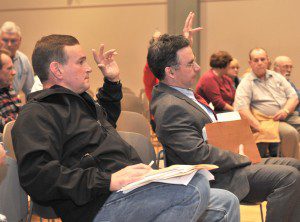
Paul Cesan, left, spouse of Southwick Selectman Tracy Cesan, and her attorney, Timothy J. Ryan, prepare to be recognized for public participation during a Selectmen’s meeting at Southwick Town Hall. Attorneys for Cesan and the Town of Southwick were on hand to help define Cesan’s role regarding conflicts of interest. (File photo by chief photographer Frederick Gore)
“I don’t think we’d be here tonight if you two had accepted her from the beginning,” resident Jack Sinico said to selectmen Arthur Pinell and Russell Fox. “That’s the problem.”
Victoria Hickey, a town employee, praised Pinell for his handling of the situation.
“I just want to commend the chairman Art Pinell for trying to keep order for this Board of Selectmen’s meeting as with previous meetings,” said Hickey. “It has been a bit of a challenge and your patience has not gone unnoticed. Thank you.”
In December, the ethics commission again weighed-in on the situation.
General Counsel Deirdre Roney ruled in a Dec. 12 letter that Cesan could participate in evaluating Chief Administrative Officer Karl Stinehart and she is also able to vote on his reappointment.
Roney came to the conclusion after reviewing a letter from Attorney Dimitrios Moschos and materials submitted by Cesan.
Roney said there are precedents that would prohibit Cesan from participating in Stinehart’s performance evaluation and reappointment if he had “direct, immediate power to decide pending matters in which Ms. Cesan has a financial interest,”
Roney said that based on materials supplied from both sides, “it does not appear that he does.”
Roney also addressed the situation from a personal point of view.
“The adversarial tone of some of the materials submitted to me prompts me to express the hope that all involved in this matter can endeavor to put aside their personal differences and work for the good of the town,” Roney wrote.
Pinell’s response to the letter was that he needed time to review it.
“The board needs a chance to review it and speak to counsel about it,” said Pinell. “I anticipate we will be discussing it at a very near future meeting with the entire board.”
The Board of Selectmen will likely take up the letter at one of its January meetings.

